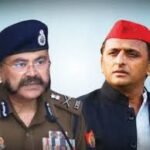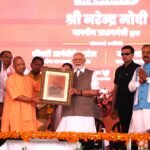
ARABIAN TIMES NEWS NETWORK
In yet another reshuffle atop Uttar Pradesh’s law enforcement pyramid, the state has been handed a new acting Director General of Police (DGP). The outgoing officerPrashant Kumar, who briefly occupied the coveted post, stepped down today leaving behind a cloud of public criticism and unanswered questions about his tenure and its legacy.
As he exits, a haunting question echoes in the corridors of power : what did he truly gain from his time at the helm? Samajwadi Party Chief Akhilesh Yadav, voicing this sentiment on X, struck a chord with many who saw the officer’s term not as one of reform, but of resignation to political compulsions, and to the habit of defending the indefensible.
Observers argue that instead of serving the Constitution and the cause of justice, the officer spent much of his tenure safeguarding the interests of those in power. He did not rise in defiance of wrongdoing, but rather stood firm behind it, often justifying decisions that should have been questioned, not protected.
Had he placed loyalty to law above loyalty to leaders, perhaps he might have walked away with a measure of dignity, even if not in the eyes of the establishment, then at least in his own. But that moment has passed. Now, the baton passes to a new face, one who steps into a system already strangled by political interference, institutional uncertainty, and a deepening distrust among the public.
All eyes now turn to the incoming acting DGP. Will he possess the strength to rise above political pressures and restore credibility to the force? Or will he, too, be swallowed by the same tangled web that ensnared his predecessor, reduced to a pawn in a larger game of power and perception?
Meanwhile, Uttar Pradesh continues to stumble under the weight of a fraying law and order structure. From the escalating violence in rural regions to sensational crimes in the cities, citizens increasingly view the police not as protectors, but as passive spectators, often complicit, rarely courageous.
At the heart of this decline is a leadership vacuum, born out of a prolonged tug-of-war between Lucknow and Delhi. The “double engine” government, heralded as a symbol of unity and efficiency, now appears incapable of appointing even a permanent police chief. If naming a single officer turns into a battleground, what hope remains for good governance?
Until the day policing is freed from the grip of politics, the people of Uttar Pradesh will continue to bear the brunt not just in grim headlines and court delays, but in the quiet erosion of their trust, safety, and hope for justice.
Top of Form
Bottom of Form










